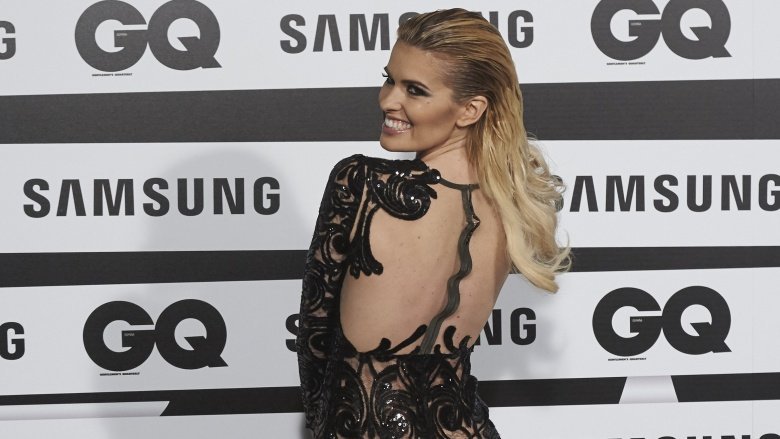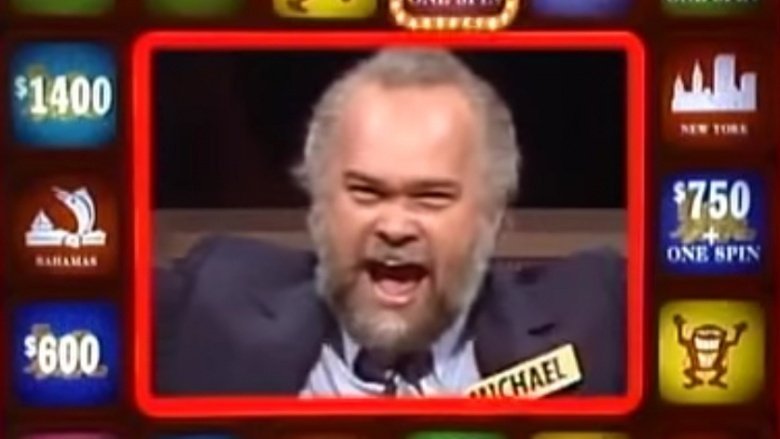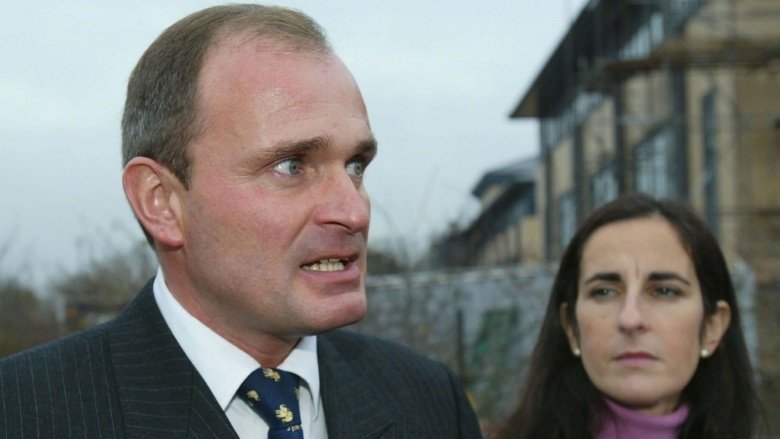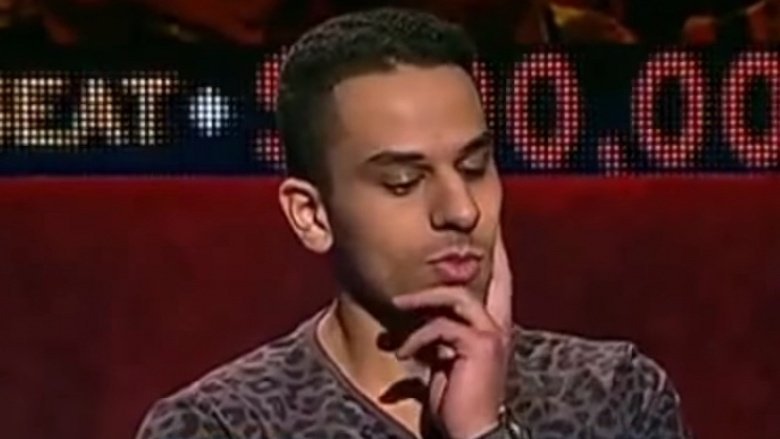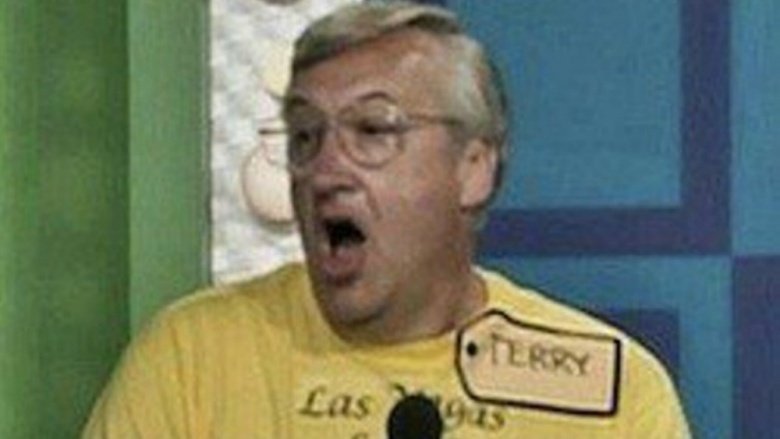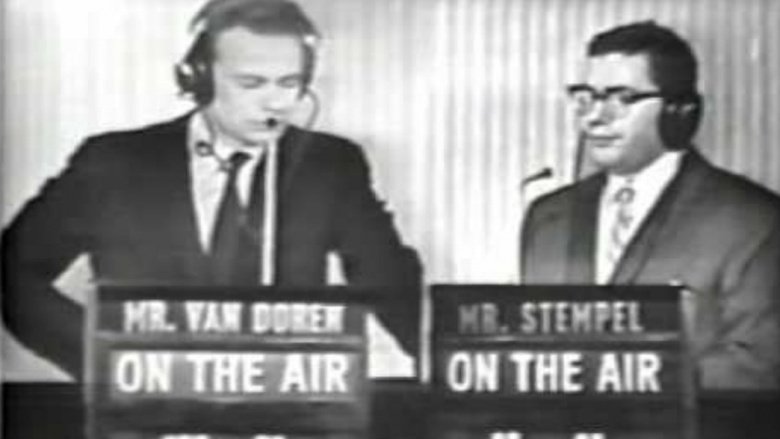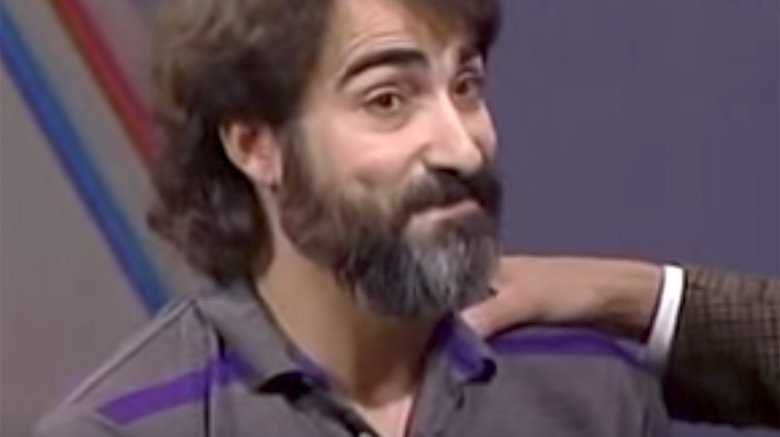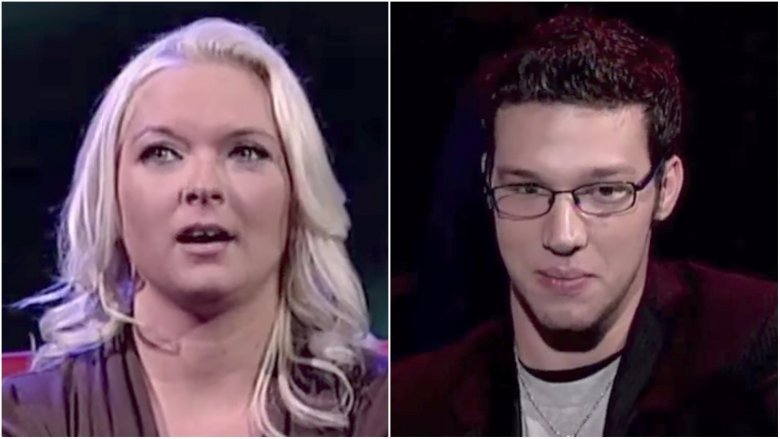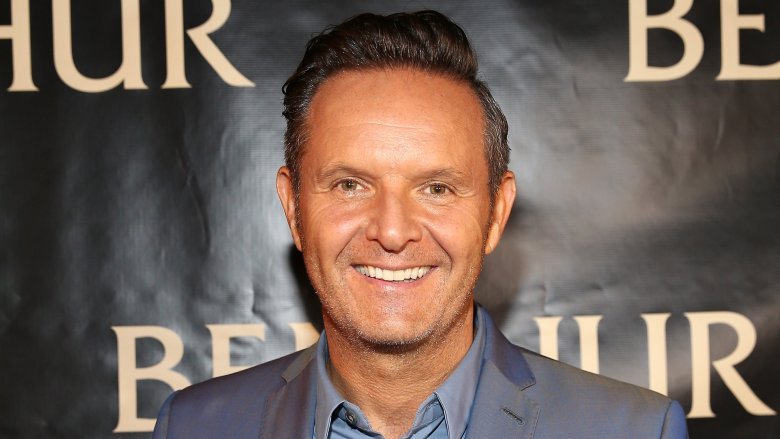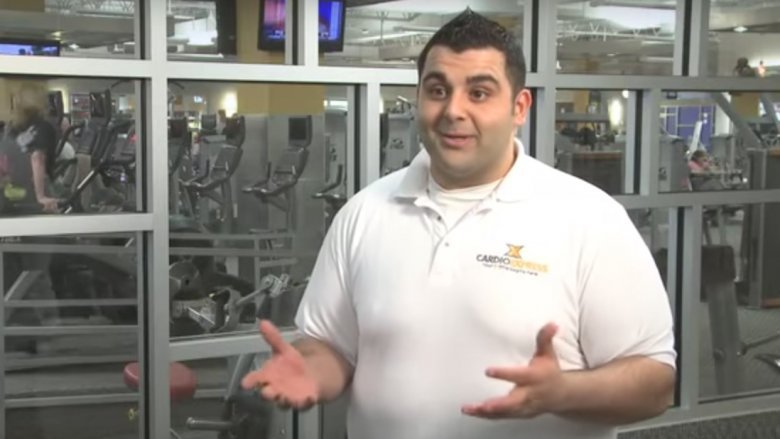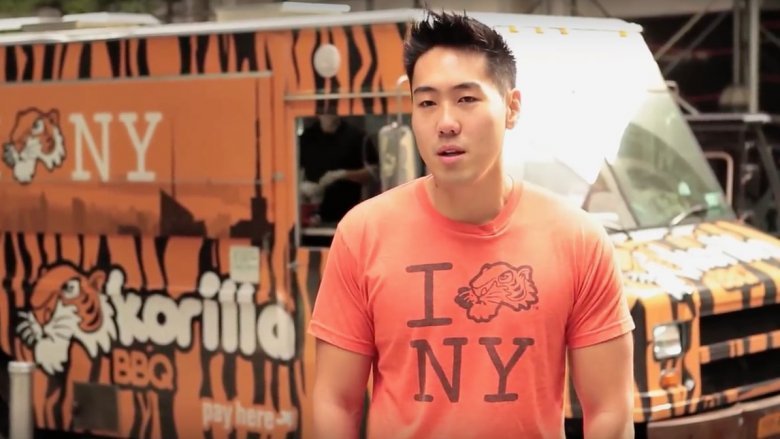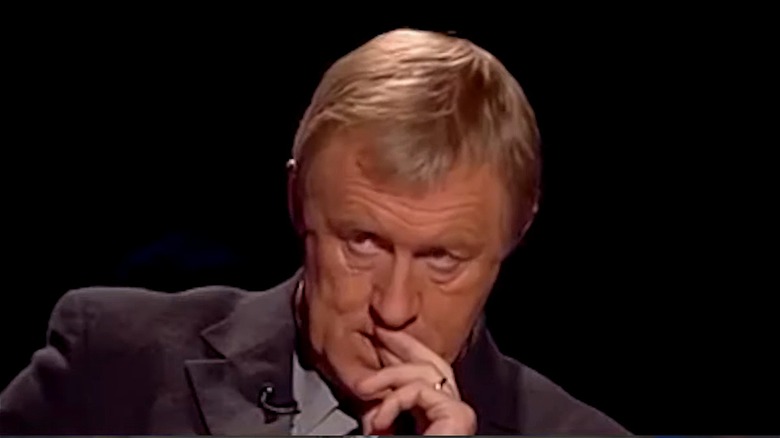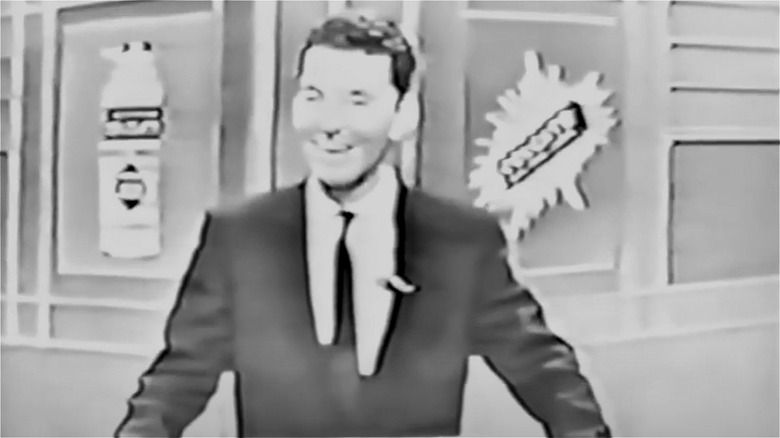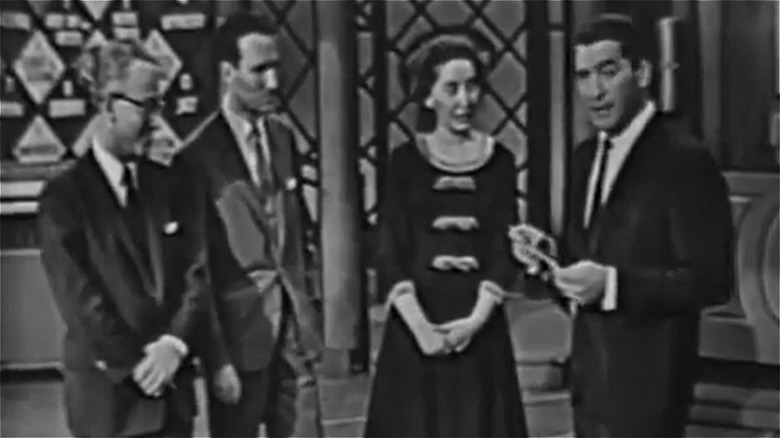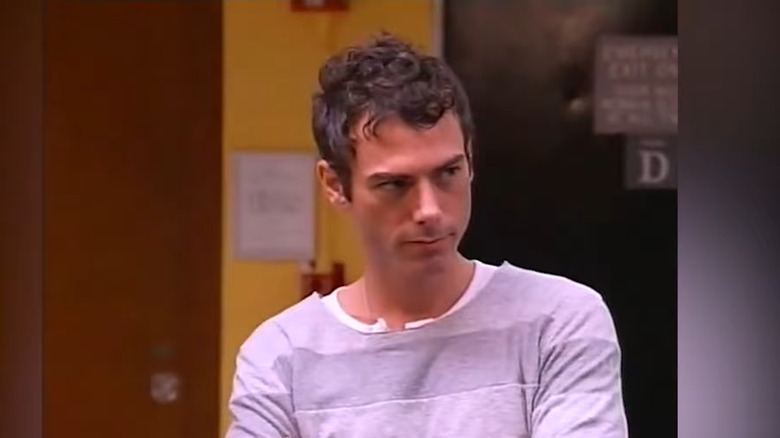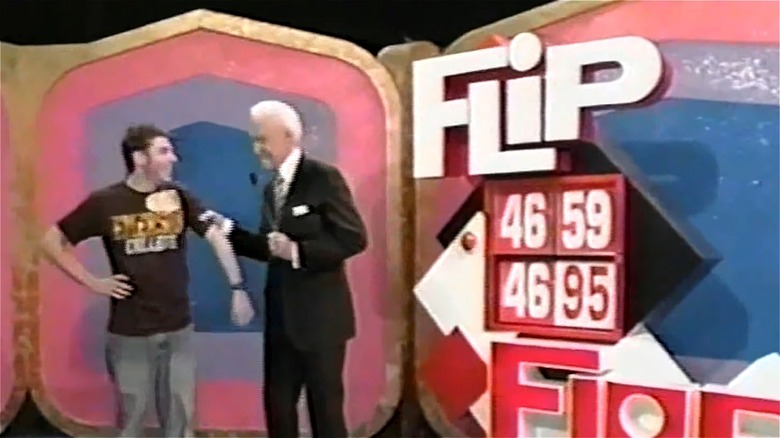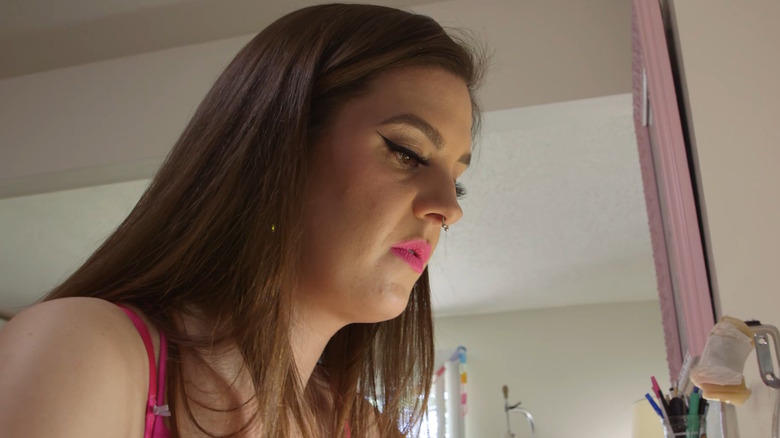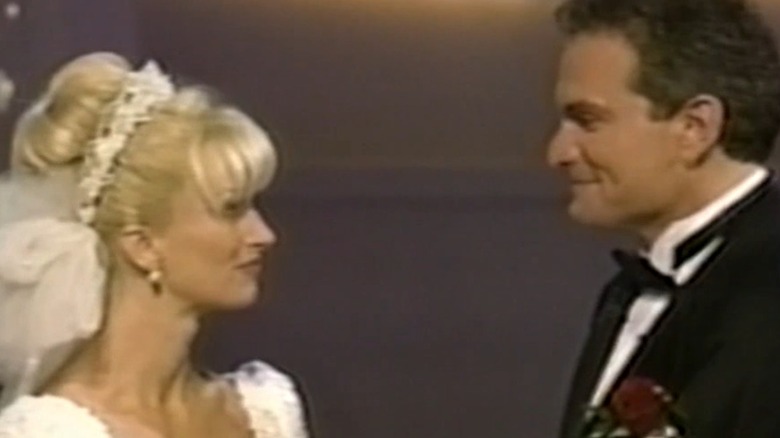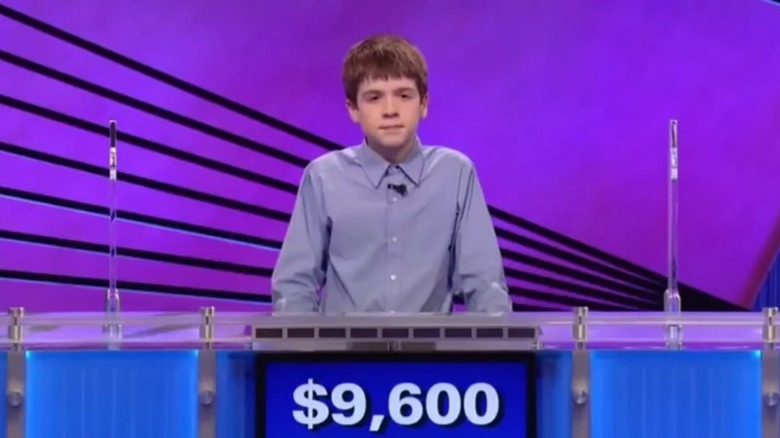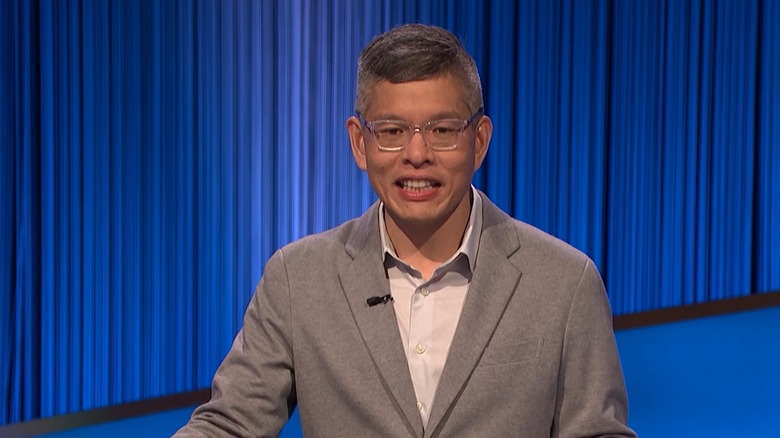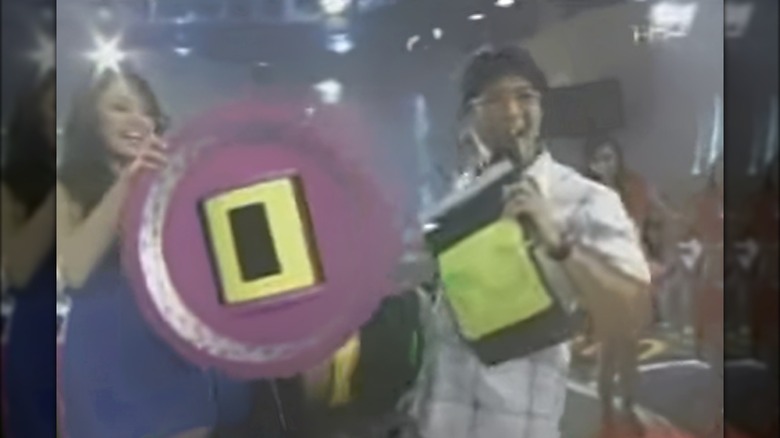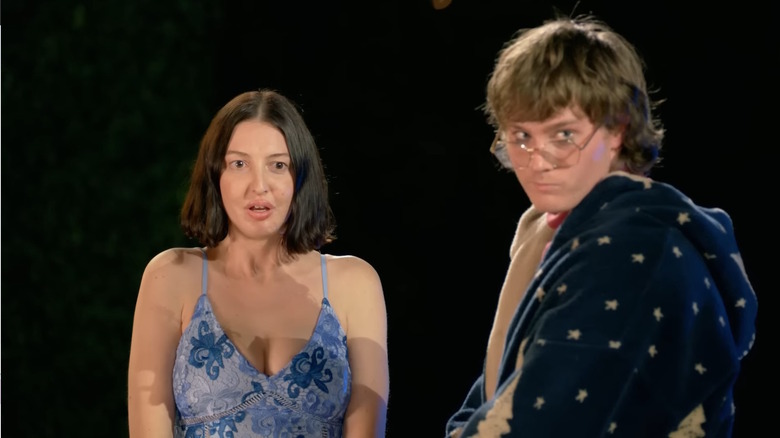The Biggest Game Show Cheaters
The production of a game show is a well-oiled machine. Built into the process are multiple safeguards and security measures to ensure that cheating doesn't occur. (Why would cheating be so bad? Because with the legitimacy of the show in question, audiences stop watching, and advertisers drop out.) Still, despite preventive measures like searching contestants for notes and isolating the host from the contestants, a few crafty individuals have found a way to beat (or cheat) the system and win big.
Michael Larson
The basis of the 1980s CBS game show Press Your Luck was a giant, light-up game board. Filling its squares were cash and prizes, as well as an animated cartoon devil called the "Whammy." Each contestant would earn spins around the board, press a plunger, and wherever the spinning stopped, that was the prize—or if they hit a Whammy, they lost everything, including their turn.
In 1984, a part-time ice cream truck driver, who was later revealed to be a lifelong con artist named Michael Larson, appeared on the show and had an amazing string of good luck. After getting a Whammy on his first spin and having to wait through the two other contestants' turns, Larson just kept amassing money and prizes. He never hit another Whammy, and by the end of the episode he'd won a record-shattering $110,237. According to Priceonomics, his time at the board was so long, CBS had to split the broadcast into two separate episodes, but Larson wasn't just lucky—he'd studied. In the months before his appearance, he pored over videotaped episodes of the show until he memorized the patterns on the game board, knowing exactly when to hit "stop" and avoid a Whammy.
While that seems like outright cheating, even former CBS Daytime Programming Executive, Bob Boden admitted to TV Land: Myths and Legends, "There was a school of thought that because he had 'cheated,' that he wasn't entitled to his money, but the prevailing wisdom after all of these discussions was that he hadn't 'cheated,' that he was just smarter than CBS."
Charles Ingram
Who Wants to Be a Millionaire? really wants contestants to win. (It's good TV, after all, to see a regular Joe get rich.) They even provide "lifelines" such as "ask the audience" and "phone a friend," but those apparently weren't enough for disgraced Army Major, Charles Ingram, who appeared on the British edition of the show in 2001.
According to Vice, Ingram stationed his wife, Diana (who had once been a contestant on the show herself) and a friend, Tecwen Whittock, in the audience. Then, as he carefully read off each of the four multiple choice answers out loud, he'd listen for a small cough. That was allegedly a signal from his plants as to which answer he'd just suggested was the correct one. With this ridiculous method pioneered by cheating high school students, Ingram won the million-pound grand prize. The scheme was ultimately discovered and all three were found guilty of "procuring the execution of a valuable security by deception"—in other words, fraud. All three received suspended prison sentences—The Ingrams got 18 months each, and Whittock, 12 months—as well as fined. Additionally, Ingram was "stripped of his title by the Army Board, after 17 years of service."
And just in case you're wondering whether Ingram's dubious coughing scheme was as laughable as it sounds, here's a handy compilation of each sketchy throat-clearing in all their conspicuous glory.
Adriana Abenia
In 2014, Spanish model Adriana Abenia appeared on Pasapalabra, Spain's version of Password. According to The Daily Mail, Abenia's blatant cheating scheme occurred during a segment where she had to listen to a series of song clips and identify the name and performer—and the host and other contestants noticed that she kept looking at a phone she had hidden between her legs. It turns out Abenia had been using the music identification app Shazam to, well, identify the music.
She was called out on it right on the show, but everyone seemed to just laugh it off. The host, Christian Galvez, even said, "To be honest I think she deserves a special prize anyway because in seven years of organizing this TV contest, nobody has ever done anything like this and certainly not quite as brazenly."
In an interview a few days after the episode, on the radio show Atrévete, Abenia said (via Google translation), "I want people to understand that television is a spectacle. I have been many times in Pasapalabra and I want to enjoy myself, but above all that people enjoy. I do not understand that those who go there no longer use what technology puts at their fingertips." She added, "No one told me that they could not cheat, and in life do not take anything for granted. You also have to understand that it was to help someone else. I'm very altruistic."
Khaled El-Katateny
Millionaire Hot Seat is an Australian spinoff of Who Wants to Be a Millionaire? In 2014, a cocky 19-year-old law student named Khaled El-Katateny appeared on the show and racked up winnings of $100,000. But after the show aired, he told the media that he cheated—sort of. "I didn't play the game—I played the man," El-Katateny famously told the press after his big win. Huh?
According to El-Katateny, he claimed to nail correct answers to the questions not through knowledge, but by watching the body language of host Eddie McGuire as he read off the multiple choice possibilities. "If you look at it, you see me working Eddie McGuire. I'm reading every single subtle thing about his face," El-Katateny said, claiming he also watched the studio audience behind McGuire to see which choice made their faces light up.
In the end, El-Katateny got to keep his money, because utilizing a poker strategy for a trivia game technically isn't against the rules. When asked about his plans for his "winnings," El-Katateny said, "I didn't win anything—I earned it."
Terry Kniess
The Price is Right seems like a difficult game show to win because it involves guessing the "actual retail price" of items—which never seem to be anywhere near what you'd see at an actual store. That's just a small part of why it's so remarkable that in 2008 Terry Kniess put in a bid of $23,743 during the "Showcase Showdown"—which was the exact, perfect price. How'd he do it?
According to Esquire's lengthy profile of Kniess, the man is an analytical genius, an award-winningly accurate former meteorologist and expert blackjack player/card counter whose natural inclination is to recognize patterns. As such, Kniess observed The Price Is Right from a unique perspective, and he had actually set his sights on the show long before announcer Rich Fields told him to "come on down." Kneiss told Esquire that he and his wife recorded episodes of the popular daytime game show every day for four months, then memorized the prices of all the items used (and frequently reused) in the Showcase Showdown segment.
But host Drew Carey floated another theory: in the audience during taping was Ted Slauson, a regular Price attendee and one-time contestant, who, like Kniess, had amassed an encyclopedic memory of Showcase Showdown prices. Carey and show producers seemed to think that Slauson colluded with Kniess and used hand signals to tell him the perfect price, a charge both men deny. As with Michael Lawson, Kniess got to keep his winnings, because despite their suspicions, the show couldn't prove he and Slauson colluded, or for that matter, did anything wrong other than being extremely accurate.
Jack Barry, Dan Enright, Al Freedman, Herb Stempel, and Charles Van Doren
Most game show cheats are contestants, going at it alone. Not so in the scandal surrounding the game show Twenty One in 1956, which involved the show's producers rigging the game. According to Charles Van Doren's 2008 New Yorker account of the scandal, producers Al Freedman, Jack Barry, and Dan Enright colluded with both Herb Stempel and Van Doren in a carefully choreographed execution of what appeared to be high-stakes game show drama.
After around six weeks of coached-winning for Stempel, the show saw a dip in ratings which was perceived to be due to the unlikable nature of the quirky New York postal clerk. The solution? Drum up interest with a new contestant. Van Doren, a handsome English professor at Columbia University, and son of a prominent poet and academic was the perfect choice. He was similarly coached, and after some staged episodes that ended in ties, Van Doren eventually overtook Stempel. Both Stempel and Van Doren walked away with a bunch of cash, and ratings were up. Win-win, right? Wrong.
News of the true nature of Twenty One broke in 1957 when Stempel, after blabbing to a bunch of New York newspapers, eventually testified to a grand jury, making him the first domino to fall in what eventually led to congressional hearings. According to Boston.com, Congress even passed "an amendment to the Communications Act of 1934, making it officially illegal to fix quiz shows," but it didn't much matter, because the networks were so spooked that they abruptly cancelled many of their primetime game shows. The whole filthy affair was later dramatized in the 1994 Robert Redford movie, Quiz Show.
Kerry Dee Ketchum
In 1988, Kerry Dee Ketchum won $58,650 on NBC's Super Password, making him "the largest one-game winner in the history" of the show, according to The Orlando Sentinel. Unfortunately, his victory would be short-lived when instead of walking away with a prize check, Ketchum was taken into custody by Secret Service agents when he returned to the show's offices to collect his winnings.
Not only did Ketchum use the alias Patrick Quinn on the show—the name of a former college professor, according to The LA Times—but he was also on the run from fraud charges in Alaska and Indiana. After his arrest, Ketchum pleaded guilty to "two counts of mail fraud," out of what prosecutors described as "a virtual tornado of deception." He was eventually sentenced to five years in prison. Though no one ever accused him of unfairly gaming Super Password, it's unclear whether Ketchum was able to keep his prize money, but we highly doubt it.
As for how this makes him a cheater? What are the chances NBC would have cast a guy that was wanted in two states for crimes including allegedly staging "an elaborate hoax in which he faked his wife's death to collect on a $100,000 insurance policy?" Probably not good.
Lauren and Frank Cleri
Moment of Truth was a game show in which contestants answered extremely personal questions while hooked up to a polygraph, then wagered against their results live in front of family and friends. One deceptive response, no matter how many painfully true revelations before it, meant zero cash. With that kind of precarious set-up, it's kind of amazing that the only real scandal to come out of the show is when married couple Lauren and Frank Cleri basically colluded to make it look like they were revealing huge and terrible secrets about their marriage.
The biggest bombshells, according to the couple's interview with The New York Post, was that Lauren wished she'd married her ex-boyfriend instead of Frank, and that she'd been unfaithful to him. Except in that same interview, the Cleris admit that they talked about all of the questions beforehand, and were more taken aback at the national headlines generated by their appearance than they were at their supposed marital problems. Their supposed plan was to do what they said they thought was going to be a little-known TV show, then split whatever cash they made from it.
But it's even murkier than that, because in another interview with People, Lauren further admitted that she never physically cheated on Frank, despite answering "yes" to whether she'd "had sexual relations with someone other than" him. "I didn't actually sleep with someone but I thought about it," Lauren said, claiming that she and Frank "believe that infidelity includes the physical and emotional." Okay. The good news is that they didn't actually win a single penny from the show. The better news is that happened as a result of Lauren answering "yes" to the question of whether she thinks she's a good person, which means the polygraph basically said, "Nope. No you are not."
Our Little Genius
This one comes with a bit of an asterisk, because the whistle got blown on Our Little Genius before a cheater ever got the chance to scandalize the series. According to The New York Times, the show that would have supposedly given "real child geniuses a chance to put their incredible knowledge to the test and win cash for their families," hit a permanent roadblock when a contestant's parents filed a complaint letter to the FCC, alleging that "the program's production staff reviewed with the contestant and his parents a list of potential topics and gave specific answers to at least four questions that the child either did not know or about which he was unsure."
In a surprisingly swift and dramatic reaction to the complaint, which was received by the FCC on December 22, 2009, show creator Mark Burnett issued a statement (via Variety) on January 7, 2010—just six days ahead of the show's planned premiere—that indicated his series wasn't about to become the modern day Twenty One. "I recently discovered that there was an issue with how some information was relayed to contestants during the pre-production of Our Little Genius. As a result, I am not comfortable delivering the episodes without re-shooting them. I believe my series must always be beyond reproach, so I have requested that FOX not air these episodes," Burnett's statement read.
FOX also issued a statement, saying that the show participants would be paid the prize money during the shows they recorded, but they would not air the episodes in question. Although Burnett's statement seemed to leave the door open for a revision of the show's policies and eventual airing, Our Little Genius ended up never happening.
Neil Tejwani
We should say right off the bat here that while The Biggest Loser may not fall into the traditional category of a "game show," it is a television program that features contestants competing for prize money, so we're counting it. That said, one of the most notorious contestants in show history, Neil Tejwani, gained infamy during the fourth season when he intentionally gained 17 pounds of water weight just before a weigh-in, with the goal of sabotaging an opponent. It worked, getting competitor Jez eliminated, but it eventually came back around to Tejwani in his long-awaited elimination in the final week of competition.
Speaking with People, however, Tejwani clarified that his dastardly plan wasn't for his own benefit, but rather to help keep his original blue team members around as long as possible. "When you are on campus for four months, you don't realize how close you can get to these [people], and the thought of not having Nicole, Kae, or Ryan around for another week at that point just killed me. They brought out the best in me every day and we brought out the best in each other," he said.
The trainers weren't particularly impressed with the maneuver either, according to Reality Blurred, who quoted Bob Harper as saying, "I am so f***ing mad that I cannot even see straight right now," and Jillian Michaels describing it as "f***ing disgusting."
Korilla BBQ
First things first, we're applying the aforementioned Biggest Loser exception here as well, so just deal with it. In 2011, the NYC-based food truck, Korilla BBQ, was eliminated from The Great Food Truck Race—a reality show competition in which hopeful street chefs compete for a grand prize of $50,000—for allegedly "adding their own money to their truck sales," according to The Orange County Register. Most of the challenges on the show involve food trucks competing in different locations around the country in an attempt to rack up the highest sales within a set period of time. The team with the lowest sales gets eliminated, hence Korilla's desperate, if not ill-conceived attempt at staying alive with some bogus profit.
But the owners of the Korean-Mexican fusion truck maintained their innocence, despite an apparent confidentiality agreement that barred them from speaking out in too much detail. Per Food Network management's decision, the team was eliminated from the show after making "an unfortunate decision."
It wasn't until a 2016 interview with KoreanAmericanStory.org that Korilla BBQ owner, Eddie Song, finally cleared up what really happened. Apparently, the team decided to get creative when facing the challenge of not being able to sell meat while competing in Memphis. Thinking they were slick, Song and his crew "formed a little partnership with one of the top Memphis-style BBQ" joints, and ended up selling "two tortillas for $8," and telling customers they could "get the protein from their Memphis-style BBQ partner." It's unclear how that ever translated to them "adding their own money to their truck sales," but either way they bent the rules and got busted.
The Consortium
Most game show cheaters put their energy into finding ways around a particular show's rules. That's what Charles and Diana Ingram did with their "Who Wants to be a Millionaire" scheme. Their story was dramatized in the 2020 miniseries "Quiz." Along with diving deep into the Ingramses' backstory, the show exposed a new kind of game show cheating scandal.
The series spends some of its time following a group called The Syndicate. The group's members never meet in person, but they collaborate over the phone, trying to help each other scam their way onto various game shows. By sharing insider tips and tricks, many of the group's members wind up on multiple programs over the course of just a few years.
The Syndicate actually existed, but in the real world, it went by a different name. A man named Paddy Spooner created the group, and he called it The Consortium. In addition to using the group's tricks to score game show placements, Spooner made a killing off the other members. Essentially, he sold access to certain game shows. He would help someone land on a show in exchange for a cut of their winnings. Once on the show, members of The Consortium had to find their own ways to succeed, but clearly, some were inspired to continue cheating the system.
Dotto
"Twenty-One" is arguably the most infamous 1950s game show. The cheating scandal surrounding it eventually led Congress to investigate the entire game show industry. It might have kicked off the investigations, but "Twenty-One" was far from the only rigged show on the air.
"Dotto" was another show that eventually got wrapped up in the broader game show scandal. Part quiz show, part children's game, "Dotto" challenged contestants to answer questions to win a chance to play connect the dots. As the picture slowly filled in, contestants were supposed to guess the famous person they were drawing. The show was hosted by Jack Narz, and when the cheating story broke, no one was more surprised than him.
Narz was going about his life when he suddenly got a phone call, letting him know that the show was canceled and he wouldn't need to head to work on Monday. Apparently, one of the show's contestants became nosey while waiting for their chance to step onto the stage. They dug through the purse of another contestant and found all the answers to the upcoming questions. Narz was grilled about the cheating and even had to undergo a polygraph to clear his name. Ultimately, the producers behind "Dotto" rigged the game. The shocking reveal strengthened Congress's case against game shows of the era.
The $64,000 Question
There's one other 1950s game show that's worth mentioning. "The $64,000 Question" is almost exactly what it sounds like. The show had contestants answering trivia questions, and it made a point of finding contestants who had deep knowledge in an unexpected area, like a young woman and working psychologist with an encyclopedic knowledge of boxing history. At least, that's what it looked like. In reality, contestants were often chosen for their outward appearance and fed answers backstage.
Typically, employees of the show would strike up small conversations with the contestants while waiting for filming to begin. Buried in the otherwise innocuous small talk were hints or outright solutions to the show's most difficult questions. During the taping of one episode, a young poet from Greenwich Village started to put the pieces together. He finished out the episode with a $4,000 prize, but he was so disgusted by the cheating that he never came to collect.
The producers weren't dismayed and kept their scam going. Dr. Joyce Brothers was brought on to be a surprising boxing expert, but she did her job too well. Dr. Brothers studied up on boxing ahead of her many appearances on the show. The producers got sick of her and started to make the questions ridiculously difficult, but Dr. Brothers still nailed all the answers. She was later brought in to testify about the show's legitimacy, and though "The $64,000 Question" was a total scam, Dr. Brothers's performance on it had been legitimate.
Keith Michael on Project Runway
There are more examples of people cheating on quiz shows than any other kind of TV contest, but that's just because quiz shows are so popular. Given enough time, any game show on TV is bound to find a cheater or two. "Project Runway" is a series that pits burgeoning fashion designers against each other in a fierce, season-long competition. The show started in 2004, and just over a decade later, it got its first cheater.
Keith Michael was a contestant on "Project Runway" in 2006. His tenure on the show didn't last all that long, though. One of Michael's fellow contestants found pattern books in his room. Bringing those to the show is completely against the rules. The same week those were discovered, Michael broke another rule: He took off from the set without asking and didn't come back for several hours. "Project Runway" gave him the boot and carried on with the rest of the season.
What seems like a cut-and-dry case of cheating may not be so simple. Years later, in an interview with People, Michael still insisted that he'd never cheated. "I think this whole thing is farfetched and crazy," he said. According to Michael, the pattern books were part of his day job designing menswear and had nothing to do with the show, and he only left the set to check his email at his boyfriend's apartment. Whether or not he was trying to cheat the competition, Michael still broke the show's rules.
Flip Flop incident
We've seen cheaters deny what they did, lose their money, and even get hauled in front of Congress. Maybe the secret ingredient when it comes to cheating is to not say anything at all. There was once a cheater on "The Price Is Right" who seemed to be so surprised by his actions that he got away with what he'd done.
Host Bob Barker pulled a man named Breton onto the stage to play a quick round of Flip Flop. The game takes an item with a four-digit price point (in this case, a digital piano) and asks contestants to move some of the numbers around. Breton could have pressed on either the first two or last two digits to get an alternate option that matched the actual price.
Barker explained the rules, and it turned out that Breton didn't even have to play the game alone. The entire audience cheered him on and tried to clue him into which set of digits he should flip around. He stared at the numbers for a tense moment before reaching out and smacking the button that revealed the real price. Barker walked off the stage while the audience howled with laughter. Breton, to his credit, just looked completely confused. Before he had a chance to explain himself, Barker said that he could take the prize anyway as long as he got off the stage.
Claire Buitendorp on Project Runway
"Project Runway" may have had its first cheating scandal in 2006, but the show's troubles didn't end with Keith Michael. Years later, a woman named Claire Buitendorp got kicked off "Project Runway" Season 16 for breaking the rules, much like Michael had before her. This time, the problem was that Buitendorp had snuck a measuring tape into her room and was using it to measure clothes after hours. That was strictly against the rules. When Tim Gunn asked her about what had happened, Buitendorp owned up to cheating.
Thanks in part to her confession, Buitendorp had to leave the show. A little while later, Buitendorp's story changed. She came back for a special reunion episode, and on this "Project Runway" appearance, Buitendorp claimed that the entire cheating scandal had been a misunderstanding. She said that she'd never used the measuring tape and had brought it back to her room by mistake. According to Buitendorp, she got caught up in the heat of the moment, and when Gunn originally asked her about what had happened, "I answered the question that I thought that I had heard." She claimed that she didn't know what she was admitting to. Of course, that doesn't change what happened to her on "Project Runway," but Buitendorp's backpedaling might change some viewers' perspective of her.
Rick Rockwell and Who Wants to Marry a Multi-Millionaire?
Like so many other industries, TV is a numbers game. You've gotta throw just about every idea you have against the wall to see what sticks. There's a real incentive to try anything, but some shows should have been recognized as a mistake from the start. "Who Wants to Marry a Multi-Millionaire?" perfectly fits that bill and is likely one of the worst reality shows you forgot existed.
The premise is exactly what you're thinking. The show functioned like a beauty pageant, but the grand prize was an on-the-spot marriage to a man worth millions. The concept is practically begging for bad actors to come in and cause problems. As though trying to prove that point, the show fell on its face almost as soon as it started when the multi-millionaire in question turned out to be a fraud.
Rick Rockwell, a supposed real estate investor, married a nurse named Darva Conger in the first and only season of the show. Just days later, fans learned some shocking facts about Rockwell. He wasn't a real estate investor at all but an actor with less than a million dollars in assets. Even worse, Rockwell had a ten-year-old restraining order against him from an ex-wife who claimed he'd abused her. Luckily, Conger was able to quickly have the marriage annulled. The show reached a similarly quick end, but its legacy lives on in other dating game shows.
If you or someone you know is dealing with domestic abuse, you can call the National Domestic Violence Hotline at 1−800−799−7233. You can also find more information, resources, and support at their website.
Jeopardy! cheated a child
Do you remember when "Jeopardy!" became a spelling competition? If not, then you aren't alone. Viewers were quick to call out Alex Trebek, the game's judges, and the show's producers when a twelve-year-old contestant lost the Final Jeopardy on a minute technicality. Thomas Hurley was only in the eighth grade when he got a chance to become a competitor on the show, and by the time Final Jeopardy rolled around, he'd earned over $2,000.
Then disaster struck. Hurley answered a prompt about an 1863 document signed by Abraham Lincoln with the question, "What is the Empanciptation Proclamation?" Much like Hurley himself, you might have missed the spelling error on your first read-through. Ultimately, the judges decided that the extra "t" Hurley included in his answer was enough to disqualify him. Fans of the show were outraged on Hurley's behalf, but he took the blow in stride and put the winnings he walked away with into a college savings account.
Ben Chan also lost on a technicality
Ten years after Thomas Hurley's disappointing "Jeopardy!" loss, another spelling-related scandal rocked the show. This time, the contestant who ran into trouble was Ben Chan, who had an incredible run. Chan's time as a "Jeopardy!" star began in April 2023. His winning streak was briefly delayed by a bout with COVID, but in total, Chan won an astounding nine games.
No one can stay on top forever, but the way that Chan was taken out of "Jeopardy!" really stings. As in Hurley's game, Chan's loss came down to a misspelling. Chan answered a prompt about Shakespeare's characters from "Much Ado About Nothing" with the response, "Who are Beatrice and Benedict?" Unfortunately, the character Chan was looking for is named Benedick.
Fans were once again outraged about a "Jeopardy!" favorite being ousted on a technicality. Many pointed out that the show's rules declare that spelling doesn't count in the game. Nevertheless, a later clause in the rules spelled trouble for Chan. Spelling doesn't matter in "Jeopardy!" as long as the answer is phonetically correct. Here, the difference between a "ct" and "ck" makes all the difference. As disappointing as his loss must have been, Chan still went home with more than a quarter of a million dollars in winnings. That's not a half-bad run at all.
Wheel of Fortune pulled a fast one
"Jeopardy!" is far from the only game show that's cheated its contestants. We've already seen how game show rigging was once the bedrock of the entire genre. Modern-day shows might be more closely regulated, but even they manage to get away with giving a contestant the short end of the stick from time to time. One incident that occurred on "Wheel of Fortune" might be the most blatant example of a show cheating its players since the 1950s.
Though she didn't know it at the time, Renee Durette stepped onto the "Wheel of Fortune" stage with a massive disadvantage. She had a light Southern accent that subtly affected the way she pronounced certain words. It shouldn't have mattered, but that accent cost Durette the game.
Durette was slowly filling in the letters of a mystery phrase. She correctly guessed the letters "s," "n," "e," "m," and "g." From there, she felt confident she knew the answer and guessed, "Seven swans a-swimming." It should have been correct, but Durette pronounced the last word in the phrase "swimmin'," and the judges decided she was incorrect. Durette graciously accepted the loss, but fans of the show came out swingin' for her online.
Hello Pappy scandal
"Wowowee" was a popular variety show in the Philippines that often gave contestants the chance to win huge sums of money. Host Willie "Pappy" Revillame (and the show itself) landed in hot water when a segment went wrong on air and apparently revealed that the game was rigged. Revillame was going through a standard routine showing a contestant the money inside a handful of prize wheels they'd passed up. When revealing the number on the final wheel, Revillame pulled out the numbers two and zero. That clued viewers in that every wheel might contain multiple numbers that could be swapped at a moment's notice.
The Department of Trade and Industry took a serious interest in the case and opened an investigation into the show. Revillame didn't own up to any wrongdoing, but that didn't dissuade DTI. In the end, the department found that "Wowowee" had, at the very least, rigged that particular segment of the show. The network behind the series, ABS-CBN, faced a hefty fine, but "Wowowee" was allowed to continue airing.
Claim to Fame cheating incident
"Claim to Fame" is an ABC show that kicked off in 2022. Hosted by Kevin and Frankie Jonas, each season gathers a group of people with famous relatives and puts them together under one roof, sort of like "Big Brother." While living in the house, contestants take on various challenges and also try to figure out who's related to whom. The entire show would fall apart if any contestants had time to Google their roommates, which is why phones are supposed to be handed in before the show begins.
One contestant in the show's first season thought that he could get around the rules. He ended up being caught in the very first episode. Right at the end of the episode, contestants Pepper and Maxwell were supposed to guess who the other person's famous relative was. Before they had a chance, the show's producers called over the Jonas brothers, who came back a moment later with shocking news. Maxwell had snuck his phone into the house and had been caught on camera using it under the covers in his bedroom. The Jonas brothers revealed that Maxwell is Chuck Norris's grandson before asking him to leave the show for good.
